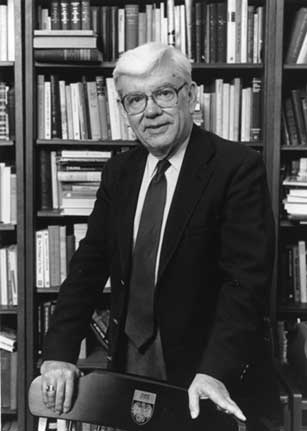 Jaroslav Pelikan was born in Akron, Ohio on December 17, 1923, to parents from Slovak families, who were born in Slavic Europe. Dr Pelikan’s father was a Lutheran pastor and his paternal grandfather was a bishop of the Slovak Lutheran Church in America. For most of his life Dr Pelikan belonged to the Lutheran Church, but in 1998 he and his wife Sylvia were received into the Orthodox Church in St Vladimir’s Seminary Chapel.Members of Dr Pelikan’s family remember him saying that he had not as much converted to Orthodoxy as "returned to it, peeling back the layers of my own belief to reveal the Orthodoxy that was always there."
Jaroslav Pelikan was born in Akron, Ohio on December 17, 1923, to parents from Slovak families, who were born in Slavic Europe. Dr Pelikan’s father was a Lutheran pastor and his paternal grandfather was a bishop of the Slovak Lutheran Church in America. For most of his life Dr Pelikan belonged to the Lutheran Church, but in 1998 he and his wife Sylvia were received into the Orthodox Church in St Vladimir’s Seminary Chapel.Members of Dr Pelikan’s family remember him saying that he had not as much converted to Orthodoxy as "returned to it, peeling back the layers of my own belief to reveal the Orthodoxy that was always there." Dr Pelikan often quoted a line from Goethe’s “Faust,” which says, “What you have as heritage take now as task, and thus you will make it your own.” Unlike most church historians, who focus on one period or one aspect, Dr Pelikan ranked as one of the only authorities in the entire field of Christian history. His books and articles included subjects as diverse as the New Testament, the Reformation, Saint Augustine, Kierkegaard and medieval philosophy, and he is credited with broadening Western church scholarship to include the Eastern Orthodox tradition.
In his life Dr Pelikan wrote nearly 40 books and over a dozen reference works covering the entire history of Christianity. Some of his most significant books are the five-volume “The Christian Tradition: A History of the Development of Doctrine,” “The Riddle of Roman Catholicism” and a multi-volume English edition of the works of Martin Luther. Not only was he the author of scholarly books, but he also wrote several best-sellers for general readers, including “Jesus Through the Centuries,” “Mary Through the Centuries” and “The Idea of the University: a Reexamination.”
Dr Pelikan received honorary degrees from 42 universities all over the world. He delivered the prestigious Guifford Lectures in Scotland and the Gilson Lectures in Toronto; President Bill Clinton appointed him to the President’s Committee on the Arts and Humanities, and at the age of 80, he was appointed scholarly director for the “Institutions of Democracy Project” at the Annenberg Foundation.
In 2004 the Library of Congress awarded him with the John W. Kluge Prize for Lifetime Achievement, a crowning honor in his career. The Kluge prize is awarded in areas that the Nobel Prize does not recognize, namely, the humanities and social sciences. The citation for the John W. Kluge Prize declared, “He has illuminated many aspects of both political and religious life through the visual arts, music, literature, textual interpretations and the role of the university.”
Dr Pelikan was a member of the faculty of Yale University since 1962. In 1972, Yale appointed Dr Pelikan as Sterling Professor of History. Before joining the Yale faculty in 1962, Dr Pelikan taught at Valparaiso University in Indiana, Concordia Seminary and the University of Chicago. His many positions included terms as dean of the Yale Graduate School (1973-78), as president of the American Academy of Arts and Sciences (1994-97), as board chairman of the American Academy of Political and Social Science (2003-04) and as founding chairman of the Council of Scholars at the Library of Congress.
Source: Dr Jaroslav Pelikan falls asleep in the Lord St. Vladimir's Theological Seminary.
About Jaroslav Pelikan
- Jaroslav Pelikan, Wide-Ranging Historian of Christian Traditions, Dies at 82 New York Times 05/16/06.
- Jesus on Safari: The Legacy of Jaroslav Pelikan, by Timothy George. First Things 01/26/15.
- In Memory of Jaroslav Pelikan: A Homily Delivered at His Funeral Vigil Service, by Fr. John H. Erickson, Dean. St. Vladimir’s Orthodox Theological Seminary. May 16, 2006.
- Delighted by Doctrine, by Timothy George. Christianity Today: Christian History. Summer 2006.
- The Doctrine Doctor, by Mark A. Noll. Christianity Today Online. December 2004.
- Jaroslav Pelikan: Doctor Ecclesiae, by Robert Louis Wilken. First Things August/September 2006.
- The Achievement of Jaroslav Pelikan, by David W. Lotz. First Things June/July 1992.